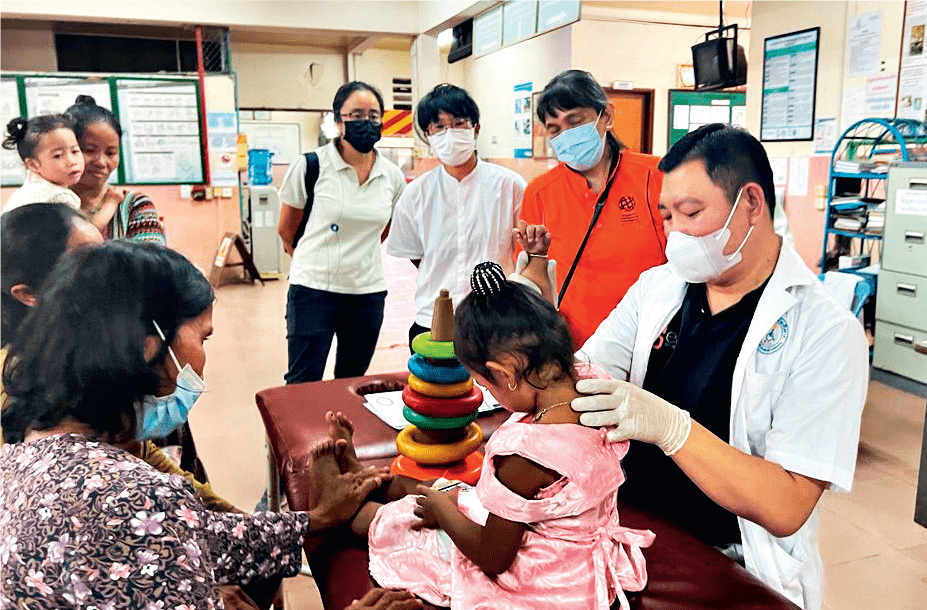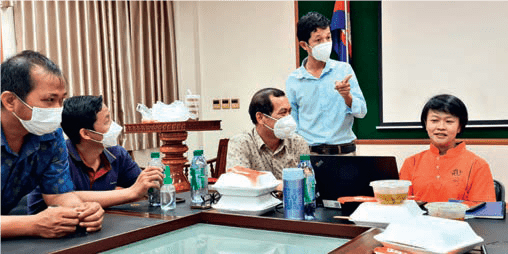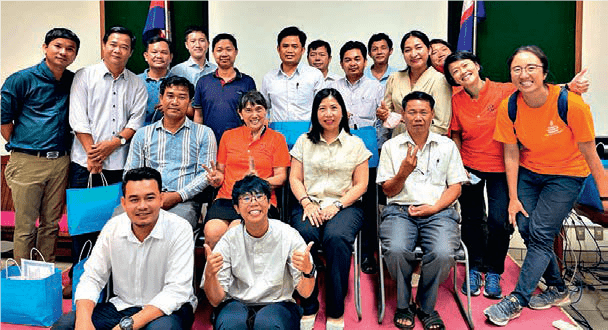Stories > When Knowledge Empowers
When Knowledge Empowers
A programme to raise the quality of physiotherapy education in Cambodia sees Singapore volunteers building capacity for local educators and healthcare professionals over 10 years.
BY RACHEL AJ LEE & ADELINE TAN
bout 80 physiotherapists completed over 1,320 hours of classroom training, with some 80,000 Cambodian patients receiving the care they need. These numbers tell the story of the Singapore International Foundation (SIF)’s Physiotherapy Bachelor Upgrade Programme – a journey that began 10 years ago in 2012.
Launched in partnership with the Technical School for Medical Care (TSMC) at Cambodia’s University of Health Science (UHS), the programme was aimed at helping local physiotherapists upgrade their knowledge and skills through a structured and recognised physiotherapy programme. The healthcare profession specialises in assessing movement dysfunctions in people, and helping to restore health and functional movement to patients before, during and after injury or disease.
“Many studies have shown that those who receive early and regular rehabilitation can be discharged earlier from hospital; have a better quality of life as they build stronger muscles, balance and endurance to continue daily activities; and are able to prevent and reduce deterioration of physical health while building stronger immunity,” explains Prof Celia Tan, who leads a team of Singapore International Volunteers (SIVs) on the project, and is currently the director and co-lead for the SingHealth Duke-NUS Global Health Institute.

The SIF-led capacity-building programme in Cambodia’s physiotherapy sector aims to train local physiotherapists.
“Our original 12 master
trainers have emerged
as strong leaders who
constantly find ways
to keep improving
physiotherapy as a
profession in Cambodia.”
Prof Celia Tan, senior director, SingHealth
Duke-NUS Global Health Institute
EARLY BEGINNINGS
It all started when Prof Tan – then President
of the Singapore Physiotherapy Association
– visited the Cambodian capital of Phnom
Penh to volunteer at an orphanage in
2002 along with her church’s youth group.
The trip enabled her to bring about
some positive change to the country in a
professional capacity.
On a second visit, she was approached by non-governmental organisation (NGO) Veterans International, which sought her help to upgrade the knowledge and skills of physiotherapists in Cambodia.
A series of partnerships with other local NGOs over subsequent years resulted in visits to local rehabilitation centres – such as Cambodia Trust, Handicap International and the International Committee of Red Cross – with the aim of helping local therapists helm these establishments.
Alongside the SIF, Prof Tan embarked on a feasibility study programme in 2011. A year later, work began on a structured two-month-long upgrade programme curriculum in Cambodia. “I learnt the value of the training-the-trainers model to ensure continuation and long-term sustainability,” says Prof Tan. “The programme began in 2015, and over three years, 12 master trainers, who had completed the programme, went on to train the fourth and fifth cohorts.”
One of the master trainers, Chanda Net, says the programme has helped to strengthen her communication and networking skills. “It was a great opportunity that helped me to improve my physiotherapy skills, as well as laying the foundation for an advanced education pathway in the future,” she elaborates.
A SUSTAINABLE PROGRAMME
A total of eight modules is taught through
the programme. They are the following:
musculoskeletal, cardiopulmonary,
neurology and geriatric, paediatrics
and women’s health, community-based
rehabilitation, research thesis, wheelchair
prescription, as well as evidence-based
practice and health promotion.
So successful was the intervention that the UHS requested for assistance to review its existing Associate Degree or Diploma Physiotherapy Programme. This provided Prof Tan and her team the opportunity to upgrade the course to a Bachelor’s Degree Programme via a Bridging Programme.
The 12 master trainers were enlisted to help draft the new curriculum. Recognised internationally, the course is aimed at upskilling current Physiotherapy Diploma holders through 1,320 hours of classroom learning – both theory and practice – as well as clinical attachments with 15 partner hospitals.
One of the programme components entails undergoing training for a few months in Singapore. And for master trainer Hoeung Heam, such a collaboration will ultimately enable him to contribute to this sector within his country’s larger development context. “The lessons I learnt have been translated into my work as a senior physiotherapist, a rehabilitation project manager and a faculty member back home,” he says. “More importantly, the intensive training in Singapore prepared me for the academic rigour in Australia.”

Irene Toh (in orange) was based in Cambodia for seven months to launch the upskilling course.
THE BUMPY ROAD TAKEN
To ensure a smooth curriculum rollout,
Irene Toh, who was then a senior
physiotherapist with Singapore General
Hospital, had to be based for seven months
in Cambodia as an infield SIV.
“I had to work with many trainers and participants from different institutions both in Singapore and in Cambodia; manage inter-professional expectations; and meet patient and community needs,” recalls Toh, who is now the head of department at NTUC Health Co-operative Limited.
“I value the experience and the insights gained from volunteering in Cambodia. It has taught me things such as working with different systems and a different culture, as well as calibrating myself to accommodate what might be more important for the Cambodians than what is for me.”
A MEANINGFUL JOURNEY
The Bachelor’s Bridging Programme has
since upskilled 23 physiotherapists. Ly
Sophea, a native of Takeo Province, is a
graduate of this programme, and currently
in charge of Physical Therapy Service and
Special Education with French NGO For a
Child’s Smile (Pour un Sourire d’Enfant).
“This programme has not only helped me to improve my treatment techniques but I have also gained more confidence to support physiotherapy students as a mentor when they come to my organisation to intern,” she shares.
Today, the enhanced standard of physiotherapy education in Cambodia has led to an overall perception of physiotherapy as a viable career path. The 2021-2022 academic year, for instance, saw 31 students registering for TSMC’s Physiotherapy Bachelor’s Degree Programme – a fivefold increase in enrolment since 2017.

Prof Celia Tan (middle row, second from left) has been instrumental in establishing a structured and internationally recognised Bachelor’s Bridging Degree programme for existing as well as aspiring Cambodian physiotherapists.
“I value the experience and the
insights gained from volunteering in
Cambodia. It has taught me things
such as working with different
systems and a different culture.”
Irene Toh, head of department, NTUC Health Co-operative Limited
The sector has improved links with global peers from the same profession, after the graduate trainees, at Prof Tan’s encouragement, established the internationally recognised Cambodian Physical Therapy Association (CPTA).
In 2018, the Cambodian Ministry of Health and Ministry of Social Affairs, Veterans and Youth Rehabilitation approved a set of national standards for the Physical Therapy Professional Practice. It cites the contribution of the SIF’s programme in Cambodia.
A bigger sense of achievement comes from the fact that even Cambodians from rural areas are now better aware of the benefits of rehabilitation services. More people now travel to the nearest city to avail of these services instead of the previous practice of going to shamans.
“The Physiotherapy Bachelor's Bridging Programme has been successful with the involvement of many stakeholders, especially the facilitation from UHS and the support of the SIF to bring healthcare professionals from Singapore to teach both theory and practical clinical internship,” says Mr Song Sit, President of CPTA.
As a further testament to the SIF’s sustained effort towards physiotherapy in Cambodia over the years, Prof Tan was conferred the prestigious Monisarapon Thipadin award by the Cambodian government in 2019. But she points out that a large part of the credit goes to the master trainers who have stayed the course.
“Our original 12 master trainers have emerged as strong leaders who constantly find ways to raise the standard of physiotherapy in Cambodia. It has been a long, meaningful journey, and everything began with just a simple first step in the right direction,” she concludes.
